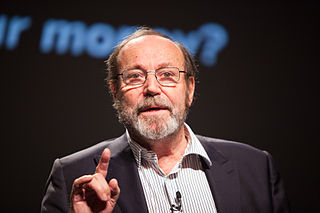A Quote by Satish Kumar
At the moment, for example, maybe ten percent of money in the world is related to goods and services. Ninety percent of money is just moving around the world, chasing money. So, money has become the ruler. And we have become the servant.
Related Quotes
To walk in money through the night crowd, protected by money, lulled by money, dulled by money, the crowd itself a money, the breath money, no least single object anywhere that is not money. Money, money everywhere and still not enough! And then no money, or a little money, or less money, or more money but money always money. and if you have money, or you don't have money, it is the money that counts, and money makes money, but what makes money make money?
Great people in the United States have been disenfranchised.I'll give you an example, it has always been the way to do it, to work hard, save your money, put your money in the bank, get interest on your money and retire wealthy, at least modestly wealthy. Well, the people that have done that have been hurt terribly because there is no interest on your money. You get no money. I just signed for some CDs where you are getting a quarter of one percent. A quarter of one percent! They don't even want your money, the banks.
As long as I hold tightly to something, I believe I own it. But when I give it away, I relinquish control, power, and prestige. When I realize that God has a claim not merely on the few dollars I might choose to throw in an offering plate, not simply on 10 percent or even 50 percent, but on 100 percent of "my" money, it's revolutionary. If I'm God's money manager, I'm not God. Money isn't God. God is God. So God, money, and I are each put in our rightful place.
The most encouraging sign is that 71 percent of the public believe the system is profoundly corrupted by the power of money. Ninety-six percent of the people believe it's "important" that we reduce the influence of money. Yet 91 percent think it's "not likely" that its influence will be lessened. Think about that: People know what's right to do yet don't think it can or will be done.
The money economy thus leaves a large ecological footprint, defined as the amount of land and resources required to meet a typical consumer's needs. For example, with only about 4% of the world's population, the United States, the largest money economy, consumes in excess of one-quarter of the world's energy and materials and generates in excess of 25 percent of the world's greenhouse gas emissions.
Charity is to unburden you from your guilt, so you say, `I am doing something: I going to open a hospital, going to open a college. I give money to this charity fund, to that trust....` You feel a little happier. The world has lived in poverty, the world has lived in scarcity, ninety-nine percent of people have lived a poor life, almost starving and dying, and only one percent of people have lived with richness, with money - they have always felt guilty. To help them, the religions developed the idea of charity. It is to rid them of their guilt.
When the banks create the money, they don't create the interest. They send you into the world to compete with everybody else to get the second $100,000 that never was created and bring it back to them. So if we're in a world with zero-growth population, goods, services, and money, the problem would be obvious.






































